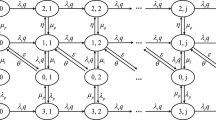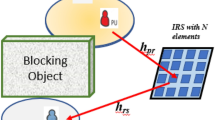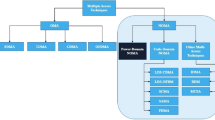Abstract
In consideration of all possible channel uncertainties without the assumption of perfect channel state information (CSI), a robust power allocation algorithm for underlay orthogonal frequency division multiple cognitive radio networks is presented. This algorithm can assign transmission power of each secondary user (SU) on each sub-carrier based on total transmission power minimization of SUs under the constraints corresponding to signal-to-interference-noise ratio of SUs and the interference power constraint to guarantee the quality of service of primary users (PUs). In addition, the CSI errors are assumed to be bounded with ellipsoid and interval sets. Through the worst case approach, the original optimization problem is converted into a convex one solved by Lagrange dual decomposition method. The proposed robust algorithm provides a trade-off between robustness and system performance. Simulation results prove that the suboptimal solution can achieve a satisfactory performance for both SUs and PUs at the same time.









Similar content being viewed by others
References
Haykin, S. (2005). Cognitive radio: Brain-empowered wireless communications. IEEE Journal on Selected Areas in Communications, 23(2), 201–220.
Mitola, J, I. I. I., & Maguire, G. Q, Jr. (1999). Cognitive radio: Making software radios more personal. IEEE Personal Communications, 6(4), 13–18.
Ghasemi, A., & Sousa, E. S. (2007). Fundamental limits of spectrum-sharing in fading environments. IEEE Transactions on Wireless Communications, 6(2), 649–658.
Goldsmith, A., Jafar, S. A., Maric, I., & Srinivasa, S. (2009). Breaking spectrum gridlock with cognitive radios: An information theoretic perspective. Proceedings of the IEEE, 97(5), 894–914.
Kang, X., Garg, H. K., Liang, Y. C., & Zhang, R. (2010). Optimal power allocation for OFDM-based cognitive radio with new primary transmission protection criteria. IEEE Transactions on Wireless Communications, 9(6), 2066–2075.
Wong, I. C., & Evans, B. L. (2008). Optimal downlink OFDMA resource allocation with linear complexity to maximize ergodic rates. IEEE Transactions on Wireless Communications, 7(3), 962–971.
Mazloumi, L., Shahtalebi, K., & Sabahi, M. F. (2015). A simple method for throughput maximization of OFDMA based CR networks. Wireless Personal Communications,. doi:10.1007/s11277-015-2875-3.
Wang, Y., Xu, W., Yang, K., & Lin, J. (2012). Optimal energy-efficient power allocation for OFDM-based cognitive radio networks. IEEE Communications Letters, 16(9), 1420–1423.
Marques, A. G., Lopez-Ramos, L. M., Giannakis, G. B., & Ramos, J. (2012). Resource allocation for interweave and underlay CRs under probability-of-interference constraints. IEEE Journal on Selected Areas in Communications, 30(10), 1922–1933.
Dashti, M., Azmi, P., Navaie, K., & Razavizadeh, S. M. (2013). Ergodic sum rate maximization for underlay spectrum sharing with heterogeneous traffic. Wireless Personal Communications, 71(1), 589–610.
Xu, Y., & Zhao, X. (2014). Robust rate maximization for OFDM-based cognitive radio networks. In IEEE Global Conference on Signal and Information Processing (GlobalSIP) (pp. 1195–1198).
Soltani, N. Y., Kim, S. J., & Giannakis, G. B. (2013). Chance-constrained optimization of OFDMA cognitive radio uplinks. IEEE Transactions on Wireless Communications, 12(3), 1098–1107.
Parsaeefard, S., & Sharafat, A. R. (2013). Robust distributed power control in cognitive radio networks. IEEE Transactions on Mobile Computing, 12(4), 609–620.
Parsaeefard, S., & Sharafat, A. R. (2012). Robust worst-case interference control in underlay cognitive radio networks. IEEE Transactions on Vehicular Technology, 61(8), 3731–3745.
Jun, P., Zhen, H., Zhengfa, Z., Wentao, Y., & Weirong, L. (2013). A worst-case robust distributed power allocation in OFDM-based cognitive radio networks. In 32nd Chinese on Control Conference (CCC) (pp. 6422–6427).
Shannon, C. E. (2001). A mathematical theory of communication. ACM SIGMOBILE Mobile Computing and Communications Review, 5(1), 3–55.
Xu, Y., Zhao, X., & Liang, Y.-C. (2015). Robust power control and beamforming cognitive radio networks: A survey. IEEE Communications Surveys and Tutorials, 17(4), 1834–1857.
Reemtsen, R., & Ruckmann, J. J. (1998). Semi-infinite programming. New York: Springer.
Bhatia, R., & Davis, C. (1995). A Cauchy-Schwarz inequality for operators with applications. Linear Algebra and its Applications, 223–224(3), 119–129.
Palomar, D. P., & Chiang, M. (2006). A tutorial on decomposition methods for network utility maximization. IEEE Journal on Selected Areas in Communications, 24(8), 1439–1451.
Eriksson, K., Estep, D., & Johnson, C. (2004). Lipschitz continuity. Berlin: Springer.
Boyd, S., & Vandenberghe, L. (2004). Convex optimization. Cambridge: Cambridge university press.
Bertsekas, D. P. (1999). Nonlinear programming (2nd ed.). Boston: Boston press.
Acknowledgments
This work is supported by National Natural Science Foundation of China under Grant Number (61571209). The authors thank the editors and the anonymous reviewers, whose invaluable comments helped improve the presentation of this paper substantially.
Author information
Authors and Affiliations
Corresponding author
Rights and permissions
About this article
Cite this article
Zhu, L., Zhao, X. & Xu, Y. Robust Power Allocation for OFDM Based Underlay Cognitive Radio Networks with Channel Uncertainties. Wireless Pers Commun 94, 3531–3547 (2017). https://doi.org/10.1007/s11277-016-3789-4
Published:
Issue Date:
DOI: https://doi.org/10.1007/s11277-016-3789-4




